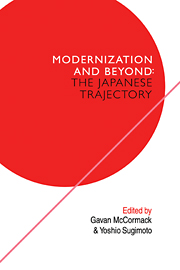Book contents
- Frontmatter
- Contents
- Contributors
- Introduction: modernization and beyond
- I Popular culture: tradition and ‘modernization’
- 1 Sumō and popular culture: the Tokugawa period
- 2 Osaka popular culture: a down-to-earth appraisal
- 3 New trends in Japanese popular culture
- II Popular movements: alternative visions of ‘modernization’
- III Uneven development and its discontents
- IV Sex, politics and ‘modernity’
- V ‘Modernization’ and ‘modernity’: theoretical perspectives
- Glossary
- Index
3 - New trends in Japanese popular culture
Published online by Cambridge University Press: 04 August 2010
- Frontmatter
- Contents
- Contributors
- Introduction: modernization and beyond
- I Popular culture: tradition and ‘modernization’
- 1 Sumō and popular culture: the Tokugawa period
- 2 Osaka popular culture: a down-to-earth appraisal
- 3 New trends in Japanese popular culture
- II Popular movements: alternative visions of ‘modernization’
- III Uneven development and its discontents
- IV Sex, politics and ‘modernity’
- V ‘Modernization’ and ‘modernity’: theoretical perspectives
- Glossary
- Index
Summary
Before dealing with my main subject, I would like briefly to examine the concept of ‘popular culture’. ‘Popular culture’ has two Japanese translations: taishū bunka and minshū bunka. While bunka covers the whole semantic extent of ‘culture’, ‘popular’ has the two different meanings of taishū and minshū. Taishū means a large number (tai) of population or groups (shū). Minshū means a good deal (shū) of ordinary people (min). For instance min-shushugi means democracy; min-kan hōso private broadcasting; min-pō the civil law; min-yō folk song; min-zoku gaku ethnology. Thus, minshū bunka is a more faithful translation of ‘popular culture’ than taishū bunka. Yet, the expression minshū bunka is not as popular as taishū bunka anymore in Japan today, so that ‘popular culture’ is usually translated into taishū bunka. This means that in the Japanese context ‘popular culture’ is absorbed by ‘mass culture’. When the difference is intentionally expressed, the term of minshū bunka is recycled.
Conceptual complications of this kind are not a mere language problem but derive from the very process by which minshū bunka becomes taishū bunka. In the English cultural-linguistic context, too, popular culture is now nothing but mass culture in the sense that traditional oral cultures are dying under the domination of overpowering mass media. Thus, I would like to use ‘mass culture’ as the expression of the popular culture that mass media create or circulate.
- Type
- Chapter
- Information
- The Japanese TrajectoryModernization and Beyond, pp. 54 - 66Publisher: Cambridge University PressPrint publication year: 1988
- 5
- Cited by

